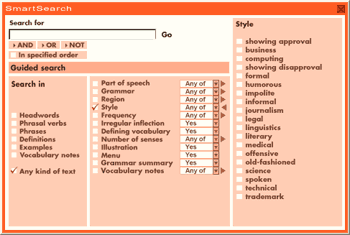
FROM THE EDITOR
 In
this Issue In
this Issue
 Contributors Contributors
 Letters
to the Editor Letters
to the Editor
 Write
to Us Write
to Us
 Spread
the Word Spread
the Word
 Back
Issues Back
Issues
 Index Index

FEATURE
 A
Tough Nut to Crack A
Tough Nut to Crack
Figures of speech and
the language learner
 Birthday
Greetings Birthday
Greetings
MED Magazine celebrates
its first birthday
COLUMNS
 Metaphor Metaphor

What we talk about
when we talk about
love
 Focus
on Language Focus
on Language
Study:
Introduction
Register
Saying the right thing
at the right time
UK version ¦
US version
 New
word of the month New
word of the month
New ways of
expressing age
 Top
Tips for the CD-ROMs Top
Tips for the CD-ROMs
Using SmartSearch to examine register and domain
 onestopenglish.com onestopenglish.com
|
Top
Tips for the CD-ROMs
by Mairi
MacDonald
This month's Top Tips column invites
you to explore issues of register and domain with your students using
the CD-ROMs. You won't need whole class access to the dictionary —
these are activities you can quickly prepare using the CD-ROMs.
By searching for words according to a particular register
or domain using SmartSearch, you can create worksheets that supplement
the article on Register
elsewhere in this issue.
In the Macmillan Essential Dictionary, the following
options are listed under style in the SmartSearch dialog box:

1 Finding examples of a specific register
The following search will find examples of frequent formal
nouns in the dictionary. Click on SmartSearch, leave the search
box blank and tick the following options:
Headwords
Part of speech: noun
Style: formal
Frequency: very high frequency/high frequency/quite high frequency
This gives you 36 results. Look through the search results
to find definitions containing example sentences. Copy and paste the example
sentences by highlighting and right-clicking the text you want to copy.

|
Activity 1
Introduce the idea of register by using the examples
from the Language Study article.
Ask students to point out the difference between the following sentences:
They found it most agreeable.
They really enjoyed themselves.
They had a ball.
Underline the
formal word or phrase in the following sentences.
| We do not release the names of our customers
without their authority. |
| The coach criticized his team for their conduct. |
| There have been no reports of car theft to
date. |
| The seller is entitled to retain possession
of the goods until they are paid for. |
| He laughed again, obviously in
a good humour. |
| Several writers of note will be at the conference. |
| She doesn't have the means to support herself. |
| Please keep your bags with you at all times. |
| The two groups are very similar with respect
to age. |
| Students will take an examination at the end
of the year. |
See
answers
Think of a synonym
for each of the words you have underlined. If you need help, look
up the word in the dictionary.
See
answers
|
|
Tip
Get students to divide
the following list into two categories: register labels and
domain labels. This will get students thinking about the
concept of register and what we mean by domain.
showing approval
business
computing
showing disapproval
formal
humorous
impolite
|
informal
journalism
legal
linguistics
literary
medical |
offensive
old-fashioned
science
spoken
technical
trademark |
|
2 Finding examples of a specific
domain
You can find examples of words from different domains
in much the same way as you do for register.
The list of words in the activity below was selected from
the search results created by checking Headword >Part of speech:
noun >Style: linguistics, legal and medical.
The original list contains 143 results, but you don't need to use all
of them!
You can introduce the concept of domain by discussing
the following examples from the article
on register and domain labels:
Wait. I'm short of respiration.
I'm just going to take out some liquid assets.
No, thanks. I'm having lunch in my abode.
|
Activity 2
Which domains do the following words belong to?
Arrange the words in the list below to complete the table.
perjury
carcinogen
plaintiff
plural
vowel
defendant
|
homonym
injunction
corpus
lesion
manslaughter
cranium |
melanoma
conjugate
mood
neurology
cardiovascular
homicide |
|
legal
|
linguistics
|
medical
|
|
|
|
|
See
answers
|
|





